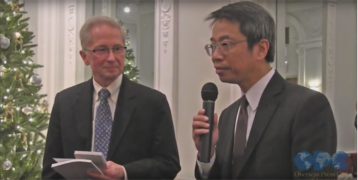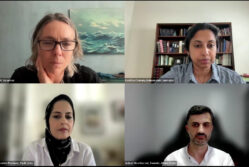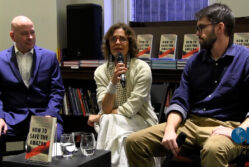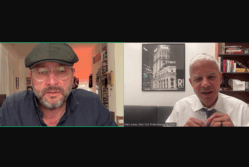Event Coverage Highlight

Hong Kong Hands Share Memories Spanning Five Decades
 By Chad Bouchard
By Chad Bouchard
Correspondents who covered Hong Kong and China gathered on Dec. 12 to swap stories and reminisce at a special OPC reunion. The evening featured comments and storytelling from notable journalists as well as representatives from the Hong Kong Economic and Trade Office, which co-sponsored the gathering.
Bill Holstein, who worked in Hong Kong as deputy Asian editor for United Press International from 1979 to 1981, said the city served as a platform to launch his career that continues to focus on issues in Asia.
“We want to acknowledge that it was a place that touched our lives and that we remain connected to,” he said during an introduction.
Joanne Chu introduced herself as the new director of the Hong Kong Economic and Trade Office in New York, having arrived in July last year. She pointed out similarities between Hong Kong and New York, both of which are centers of finance and cities with “a strong presence of international media.”
Clement Leung, the Hong Cong Commissioner to the US based in Washington, DC, dropped by the reunion to chat with journalists. Hong Kong has a separate trade mission to the US as a result of the “one country, two systems” policy of reunification that followed the end of colonial rule in 1997.
“Given the state politics in DC, I always try to get out for some fresh air,” Leung joked. He recalled a recent return to Hong Kong in November for a meeting of heads of mission. “When you land at the airport you feel the energy, you feel the vibrancy, and the intensity, but of course I enjoy the efficiency and the pace,” as well as the food, he said.
When Leung mentioned his daughter is now studying journalism in Hong Kong, Holstein piped in to recommend he “tell her to pick a different field.”
“That’s what my wife said,” Leung responded. “Our family practices ‘one family, two systems,’” he said. Leung’s wife studied journalism, so the two do not always agree on government matters, he added.
“Hong Kong Hands” at the event collectively represented experience spanning five decades, and “centuries” of coverage, Leung said on the sidelines.
Yvonne Dunleavy, who worked for the Hong Kong Standard in the 60s, remembered seeing signs of trouble brewing in the early days of the Cultural Revolution in 1966, as revolutionaries marched in formation in navy blue uniforms while holding copies of the “Little Red Book” and chanting “down with the governor!” in protest against British colonial rule.
Soon it escalated into a full-fledged civil war, she said. “Trucks and busses were overturned, people working for the British government were threatened by sympathizers in Beijing, saying ‘there’s a list and you’re going to be on it when the Maoists come.’”
Dunleavy remembered being chased into a hotel while carrying film for Life magazine, and later narrowly escaping her car being overturned by protesters.
Richard Bernstein, who covered business in Hong Kong and China for TIME magazine, went to Hong Kong in 1975 at the end of the Cultural Revolution and stayed until 1979.
He said he feels nostalgic about those years, when the city was orderly and stable and growing in prosperity.
“It never stopped thrilling me to just be in this place. It reeked of a kind of post-colonial exoticism.”
He said Westerners who became journalists after studying Mandarin and China at the time formed a fellowship of “China watchers” who monitored news of the mainland from Hong Kong, often depending on scant information like the Survey of the China Mainland Press, which published translations of Chinese radio broadcasts.
“Despite sparse resources I think we got the story right,” he said. “That there was a power struggle involving [Premier] Zhou Enlai on one side and the Gang of Four on the other, and a contest between a more reformist group and a more hard line ideological group.”
Andrew Tanzer, who worked in Hong Kong for Forbes magazine and others, told the gathering that he first went to Asia on a $3000 award from the Overseas Press Club Foundation in the early 80s to pursue a project in Taiwan.
He went to work for the Far Eastern Economic Review in 1983, replacing someone who had been kicked out by the Taiwan government.
Tanzer discussed his newly released book, Robert Kuok, about a “secretive” overseas Chinese tycoon from Malaya who made his fortune on the sugar futures market in the 1960s and spent 40 years living in Hong Kong.
Tanzer had interviewed Kouk for a cover story in Forbes magazine in 1997 – a story Tanzer said helped to start the Forbes “billionaires list” franchise – and later worked on his memoirs.
The book follows the businessman’s life as a Chinese emigrant in Johor Baru, where he attended British colonial schools and was classmates with several future Malay prime ministers and Singapore’s longtime prime minister, Lee Kuan Yew. The book has made waves in Southeast Asia because of Kuok’s comments about prominent political figures, Tanzer said. Kwok goes on to work for Mitsubishi and plays a controversial role in getting food into China during the Cultural Revolution.
The book had a limited release in English in Asia, and is slated to be available in the U.S. in March.



